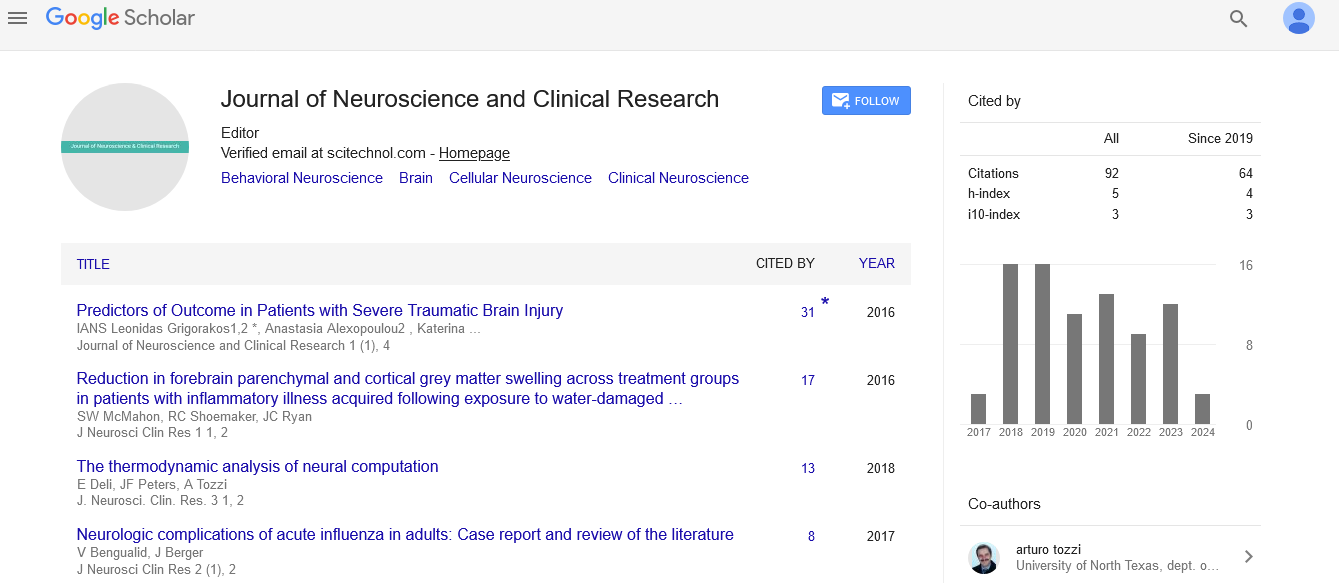Short Communication, J Neurosci Clin Res Vol: 8 Issue: 1
Emerging Therapies for Neurological and Psychiatric Disorders
Simon Vibe*
Department of Psychiatric Centre, Copenhagen University, Copenhagen, Denmark
*Corresponding Author: Simon Vibe
Department of Psychiatric Centre,
Copenhagen University, Copenhagen, Denmark
E-mail: mantonikolaidi@gmail.com
Received date: 01 March, 2023, Manuscript No. JNSCR-23-93317;
Editor assigned date: 03 March, 2023, Pre QC No. JNSCR-23-93317(PQ);
Reviewed date: 17 March, 2023, QC No. JNSCR-23-93317;
Revised date: 24 March, 2023, Manuscript No. JNSCR-23-93317(R);
Published date: 31 March, 2023, DOI: 10.4172/Jnscr.1000146
Citation: Vibe S (2023) Emerging Therapies for Neurological and Psychiatric Disorders. J Neurosci Clin Res 8:1.
Description
In recent years, there has been a growing interest in emerging therapies for neurological and psychiatric disorders. These innovative treatments offer hope for patients who have not found relief from traditional therapies. In this we will discuss some of the most promising emerging therapies and their potential applications in the field of mental health.
One emerging therapy that shows great promise for treating a range of psychiatric disorders is ketamine therapy [1]. Ketamine is a powerful anesthetic drug that has been used for decades in the medical field. However, in recent years, it has gained attention for its potential use in treating depression and other mental health conditions. Ketamine works by increasing the levels of neurotransmitters in the brain, particularly glutamate, which has been linked to mood regulation. Ketamine therapy involves a series of intravenous infusions, which have been shown to provide rapid relief from depressive symptoms. While ketamine therapy is still relatively new, it has been found to be effective in treating depression, anxiety, and Post-Traumatic Stress Disorder (PTSD) [2].
Another promising emerging therapy for mental health is Transcranial Magnetic Stimulation (TMS). TMS involves using a magnetic field to stimulate specific areas of the brain that are associated with mood regulation [3]. This non-invasive therapy has been found to be effective in treating depression, particularly in patients who have not responded to traditional treatments such as medication or psychotherapy. TMS has also shown promise in treating other mental health conditions, such as Obsessive-Compulsive Disorder (OCD) and Post-Traumatic Stress Disorder (PTSD) [4].
Gene therapy is another emerging therapy that has the potential to revolutionize the treatment of neurological disorders. Gene therapy involves altering the genetic material of cells to correct or prevent disease [5]. In the field of neurology, gene therapy is being explored as a potential treatment for conditions such as Huntington's Disease, Parkinson's Disease, and Alzheimer's Disease. While gene therapy is still in its early stages, it has shown promising results in preclinical trials and has the potential to provide long-term benefits for patients with neurological disorders [6].
Virtual reality therapy is another emerging therapy that has the potential to transform the field of mental health. Virtual reality therapy involves using computer-generated environments to simulate real-life situations and provide exposure therapy for patients with anxiety disorders, phobias. By immersing patients in virtual environments, therapists can help them confront and overcome their fears in a safe and controlled setting [7]. Virtual reality therapy has been found to be effective in treating a range of mental health conditions and is being used in clinical settings around the world [8].
Finally, neurofeedback therapy is an emerging therapy that uses real-time feedback to help patients learn how to regulate their brain activity [9]. This non-invasive therapy involves attaching electrodes to the scalp to measure brainwave activity and providing feedback to the patient in the form of sounds, images, or video. By learning to control their brain activity, patients can improve their symptoms of anxiety, depression, and other neurological and psychiatric disorders. Neurofeedback therapy is still in its early stages, but it has the potential to provide a safe, non-invasive, and effective treatment for a range of mental health conditions [10].
Conclusion
Emerging therapies for neurological and psychiatric disorders offer hope for patients who have not found relief from traditional treatments. Ketamine therapy, transcranial magnetic stimulation, gene therapy, virtual reality therapy, and neurofeedback therapy are just a few of the innovative treatments that are being explored in the field of mental health. While these therapies are still in their early stages, they have shown promising results in preclinical trials and are being used in clinical settings around the world. As research in this field continues to evolve, it is likely that we will see even more innovative therapies emerge, providing new hope and new options for patients with neurological and psychiatric disorders.
References
- Peltoniemi MA, Hagelberg NM, Olkkola KT, Saari TI (2016) Ketamine: a review of clinical pharmacokinetics and pharmacodynamics in anesthesia and pain therapy. Clin Pharmacokinet 55 1059-1077.
[Google Scholar] [Pubmed]
- Yehuda R (2002) Post-traumatic stress disorder. N Engl J Med 346(2): 108-114.
- Hallett M (2007) Transcranial magnetic stimulation: a primer. Neuron 55(2): 187-199.
[Google Scholar] [Pubmed]
- Rachel Y (2002) Post-traumatic stress disorder. N Engl J Med 346(2): 108-114.
- Wirth T, Parker N, Herttuala SY (2013) History of gene therapy. Gene 525(2): 162-169.
[Google Scholar] [Pubmed]
- Thakur KT, Albanese E, Giannakopoulos P, Jette, N, Linde M et al., (2016) Neurological disorders. Mental, Neurological, and Substance Use Disorders 87.
[Google Scholar] [Pubmed]
- Wampold BE, Scott AB, Zac EI (2017) What characterizes effective therapists?.
- Branch JR, William T, Paranjape A (2002) Feedback and reflection: teaching methods for clinical settings. Acad Med 77(12): 1185-1188.
- Haynes JD, Rees G (2006) Decoding mental states from brain activity in humans. Nat Rev Neurosci 7(7): 523-534.
[Google Scholar] [Pubmed]
- Prince M, (2007) No health without mental health. The lancet 370(9590): 859-877.
[Google Scholar] [Pubmed]
 Spanish
Spanish  Chinese
Chinese  Russian
Russian  German
German  French
French  Japanese
Japanese  Portuguese
Portuguese  Hindi
Hindi 